Montreal, Capital of Neuroscience
The 26th World Congress of Neurology (WCN) brought together over 4000 delegates from 132 countries - a success on all fronts. This biennial conference was an opportunity for world-class neurologists and leading researchers to meet and share the latest innovations in neurology.
Brain Knowledge For All
This year’s theme, Brain Health is our Greatest Wealth, highlighted the efforts to overcome the barriers to brain health and quality neurological care for all. Key moments included scientific and teaching programs, and from leading experts sharing the latest advances in neurology through plenary lectures.
Here Are Some of Our Team's Favourite Lectures
Dr. Eva L. Feldman (University of Michigan, US) shared some insight during an enlightening talk on the challenges of neurological diseases, when realizing during her research: The scale of the obesity and diabetes epidemics, and how the two diseases intertwined to cause major epidemics of neuropathy and diabetes.
Dr. Suvarna Alladi’s (National Institute of Mental Health and Neurosciences, India) presented, Bilingualism and Education as Protective Factors in Dementia, and how bilingualism can prevent dementia and its relevance in multicultural societies like Canada.
Dr. Maiya R. Geddes (The Neuro, Canada) dove into, Dementia Prevention Strategies: Lifestyle Engagement, presenting data to show that lifestyle changes such as including physical activity and healthy dietary choices, can improve cognitive activity and delay dementia by up to 40%.
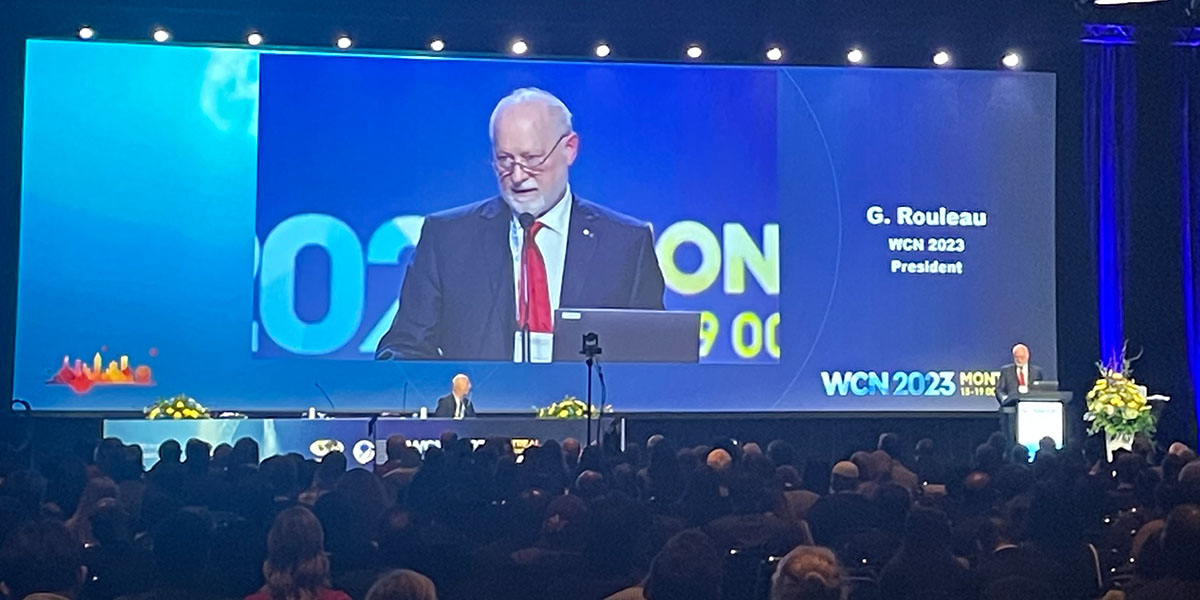
“When we gather so many brilliant minds in one place, we increase the likelihood of breakthroughs in neurological research and create the opportunity for major scientific collaborations,”
- Dr. Guy Rouleau, director of The Neuro and President of the WCN 2023
The Tournament of the Minds
This highlighted game for WCN delegates in which 12 teams competed in a spirit of camaraderie, to answer questions on clinical cases based on a wide range of neurological topics.
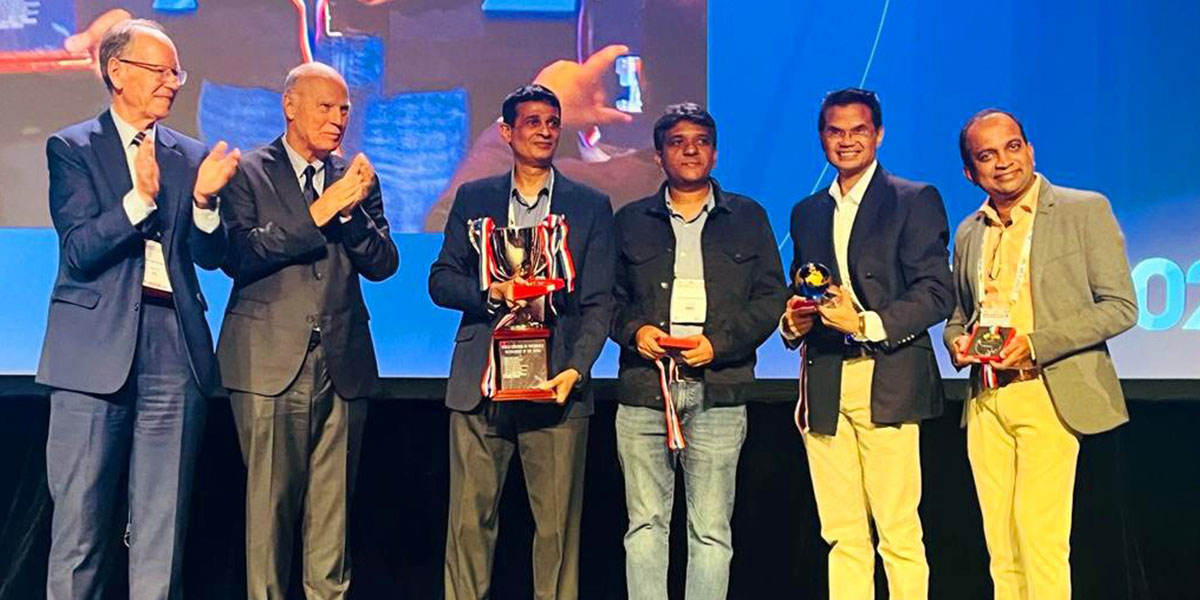
Congratulations this edition’s winners, the Sri Lankan Medical team: Prof. Thashi Chang, Dr. A. T. Alibhoy, Dr. Senaka Bandusena and Dr. Manjula Caldera pictured with President of the World Federation of Neurology Dr. Wolfgang Grisold.
All For The Cocktails
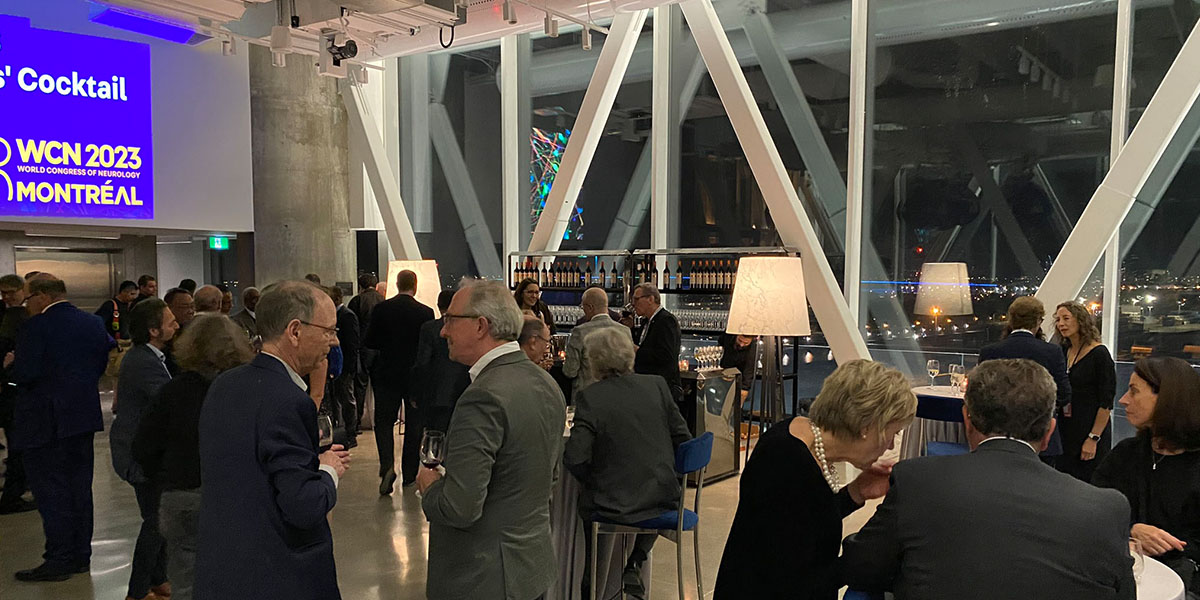
To celebrate the success of the WCN, the Neuro Director Dr. Guy Rouleau, President of the World Congress of Neurology and Alex Henri-Bhargava, President, Canadian Neurological Society invited guests to an exclusive evening of live music and gourmet cuisine in the Observation tower at the Grand Quay of the Port of Montreal.
A Neuro tour for WCN delegates
WCN delegates bonded and made new connections during tours of The Neuro which included a visit the viewing gallery of OR Theatre 1. All were thrilled to see where Wilder Penfield, Herbert Jasper and colleagues pioneered the neurosurgical treatment for epilepsy that became known as The Montreal Procedure. Delegates also got to see and learn how Neuro researchers are shaping the future of neuroscience and neurology through open science and the latest brain imaging and molecular biology technologies.

A few words from our exceptional WCN guests
“Many thanks! Hope to visit your distinguished Institute again in future!”
“Once again thank you very much for carving such inspirational memories into our minds.”
Things Got Amazing with the Amazing Brain Week!
Many other unique events were open to the greater public, as part of The Amazing Brain Week, where there was the opportunity to discover the incredible capabilities that make the brain as exceptional as it is.
Coming together as one
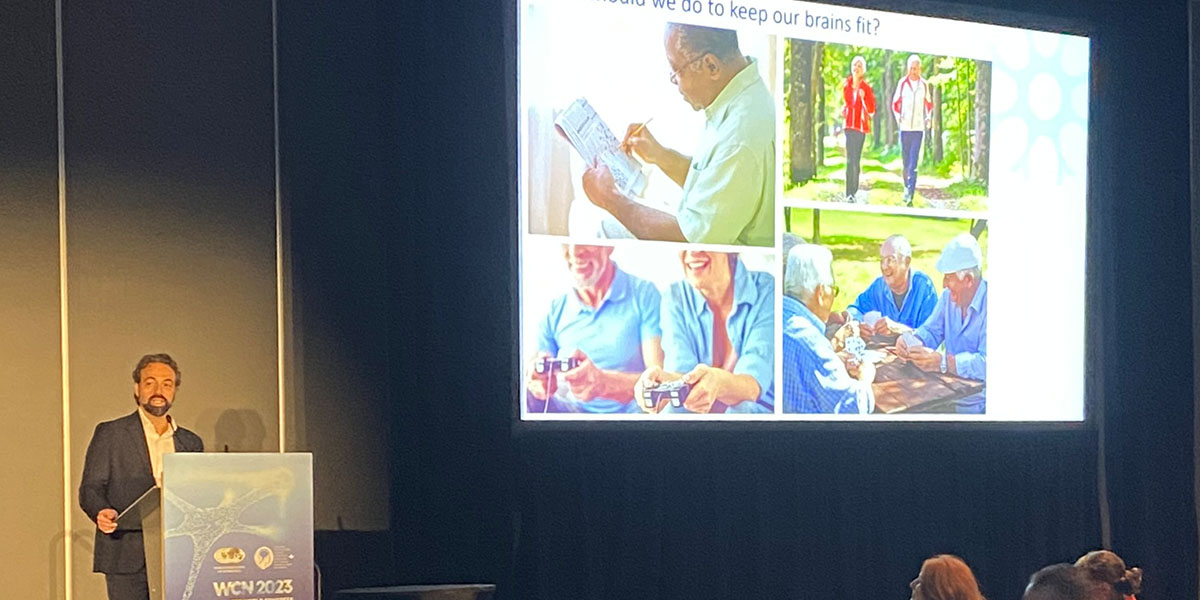
One of these events was Minding Your Brain: A Day for Patients, featuring talks and demonstrations by top experts in neurology and other fields. It was a day filled with learning and memorable moments for the more 150 participants who attended at the Palais des Congrès de Montréal.
The event showcased remarkable advancements and valuable self-care insights. Presentations included discussions on the potential of preventing neurodegenerative diseases in children before symptom onset, the progress in brain implants and AI for improved communication and mobility for paralyzed individuals. Additionally, the event emphasized the importance of self-care, with talks on how compassion triggers different brain areas to reduce stress, the transformative impact of daily mindfulness, and the significance of lifestyle changes in maintaining brain agility.
“Being involved with the Amazing Brain conference, was quite simply, amazing.
Hearing such fascinating speakers, alongside such an interested and engaged audience, was very inspirational. I walked away having learned so much.”
- Tarah Schwartz, Host, Amazing Brain Conference
This event was highly appreciated by President of the World Federation of Neurology (WFN), Prof. Wolfgang Grisold and World Congress of Neurology (WCN) 2023 Congress President and Neuro Director, Dr. Guy Rouleau.
“Health oriented follow-up encouraging actions and habits that could help promote collective health and well-being, such as embracing meditation and dropping cigarettes,”
“Thank you for organizing this event. It was very well organized. The professionalism of the staff was exemplary,”
- Attendees’ testimonies
The Brains’ Got To Go to the Movies
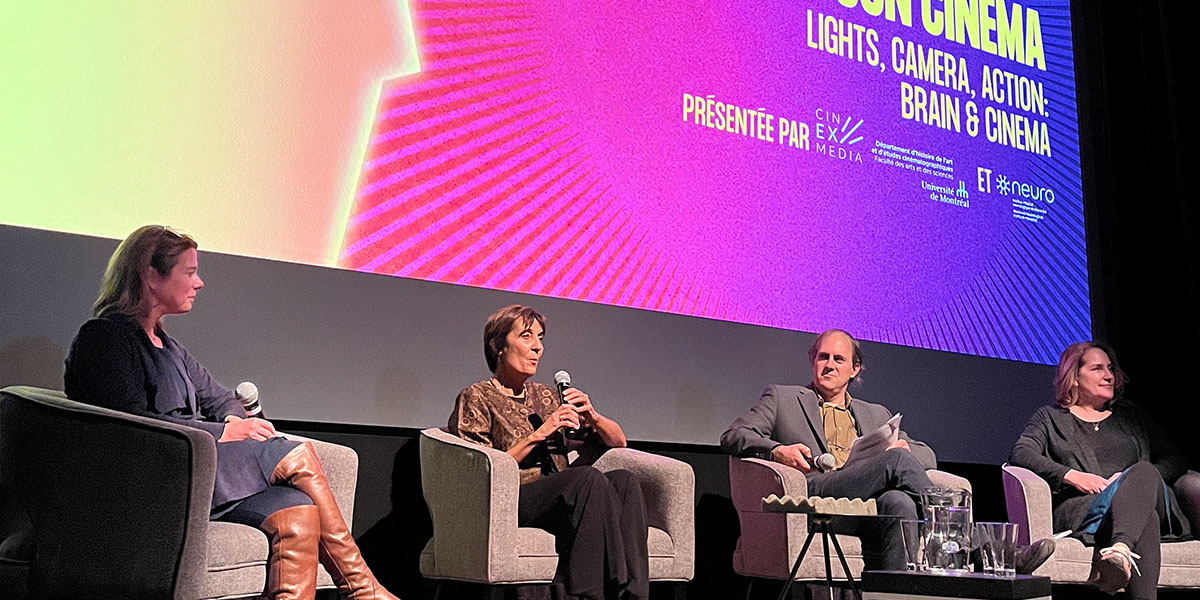
Another exceptional event part of our Amazing Brain Week, was the riveting Lights, Camera, Action: Brain and Cinema, in partnership with the Festival du Nouveau Cinema, that brought together researchers and filmmakers from across a variety of fields. Following the screening of Samsara, Santiago Hidalgo moderated a panel discussion with Ana Inés Ansaldo, Sarah Lippé, and Isabelle Raynauld who explored the connection between a film’s rhythm on brain development. From editing to story pace, the very choice of images impacts the viewers emotions. Studying the relationship between cinema and brain development is challenging because of all the factors that play info our understanding of film, something Santiago Hildago and Sarah Lippé are beginning to explore using EEG and other methods.
After the film, we caught up with festival goers who were fascinated by the event’s audacious combination of cinema and neurology. Festival attendee Jasmit Cheema noted that, “it was interesting that the director of the movie knew that we would be very resistant to a slow movie, but we would get used to it. His whole point was to create this resistance, and then have us overcome it, and the meditation in the middle of the movie was amazing because I’ve never had such an immersive experience while watching a movie. I also really enjoyed when [Isabelle Raynauld] was talking about her documentary on the difference between the beta waves observed in a person meditating versus a person praying.”
Music To Our Brains
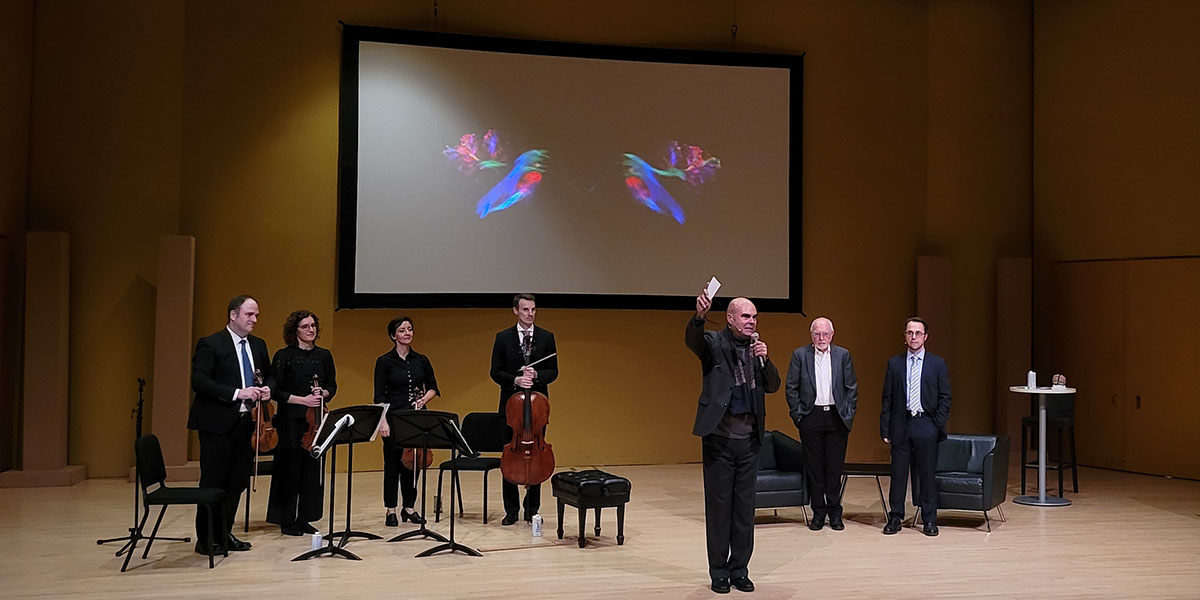
Your Brain on Music took the audience on an extraordinary journey led by cognitive neuroscientist Robert Zatorre who spent his life studying our emotional response to music and the impact of musical practice on brain plasticity and Simone Dalla Bella, professor at the Université de Montréal and co-director of BRAMS, an expert in the perception of rhythm in music and its clinical applications in neurodegenerative and developmental diseases. The audience delighted in performances and interpretations by a string quartet from the Orchestre Symphonique de Montréal. Author of Le cerveau et la musique and science journalist, Michel Rochon guided the audience on a magical musical neuroscientific journey, at the concert hall of the Conservatoire de musique de Montréal.
Music was used throughout the presentation, to show how practising music can impact the elasticity of the brain and how it can move you to feel various emotions. Musicians shared personal stories and explained to the audience how they react to the music they play; the audience also got the chance to ask many questions.
“It was a pleasure for us four musicians to take an active part in this evening. As well as learning a lot about how the musical brain works, we were captivated by the emotional aspect. What a wonderful discovery it was to put into words what we experience in our day-to-day work! We look forward to repeating the experience one day.”
- Olivier Thouin, Associate-Concertmaster, Orchestre Symphonique de Montréal (OSM)
Researchers demonstrated the power of music to help people with Parkinson’s disease with their movements and those with Alzheimer.
"An engaging and insightful event. A subtle interplay of science and arts, unfolding through a spirited musical discourse."
- Simone Dalla Bella, professor at the Université de Montréal and co-director of BRAMS.
Radio-Canada also reported on the event.
We were very lucky
Montrealers and visitors to the city explored The Art of Imaging, exhibit, an exhibition that aims to engage the public in bio-imaging research through visually impressive scientific images. The public were also treated to The Amazing Brain Science Talks, a walk through our dreams and imagination by brain experts.
The Neuro was honoured to have hosted the Amazing Brain Week and been a stakeholder in the World Congress of Neurology. We believe that sharing knowledge is crucial for accelerating the discovery of new treatments and cures for the benefit patients with neurological condition as around the world.







